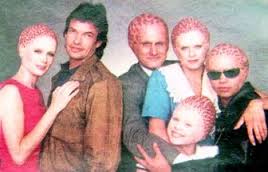Watching E4’s new 6-part drama The Aliens, I was strongly reminded of the 1989 American TV series Alien Nation, based on the 1988 film of the same name. Initially, I was struck by the similarities between the two programmes: in each an alien ship crash lands on earth, spilling it’s refugees, who then commence a new life on our planet. But, if art imitates life, then the differences between the two shows may be a mirror of how society’s views and attitudes have altered in two plus decades.
Aliens in SF are often used to represent the other: the foreigner, the outsider, the ‘not one of us.’ In both The Aliens and Alien Nation, the offworlders are literally refugees and immigrants so the metaphor is clearly drawn. So how do the respective shows reflect the social attitudes of their time and place of creation?
 In 1989, the US was still seen as the land of opportunity – “Give me your tired, your poor, your huddled masses yearning to breathe free,” as the 19th Century poet Emma Lazarus famously said. In Alien Nation, the Tenctonese, or “newcomers” as they were called, were being gradually integrated into human society, although not without being on the receiving end of a fair amount of racism – they are referred to as ‘slags;’ given silly human names such as Albert Einstein; and often have the most menial of jobs. However, they live in human neighbourhoods; mix in human society; and work their way up the employment ladder – both the film and TV series feature a human/alien police partnership, for instance. The aliens are portrayed as victims rather than threats: tellingly, the ship that crashed was a slaver.
In 1989, the US was still seen as the land of opportunity – “Give me your tired, your poor, your huddled masses yearning to breathe free,” as the 19th Century poet Emma Lazarus famously said. In Alien Nation, the Tenctonese, or “newcomers” as they were called, were being gradually integrated into human society, although not without being on the receiving end of a fair amount of racism – they are referred to as ‘slags;’ given silly human names such as Albert Einstein; and often have the most menial of jobs. However, they live in human neighbourhoods; mix in human society; and work their way up the employment ladder – both the film and TV series feature a human/alien police partnership, for instance. The aliens are portrayed as victims rather than threats: tellingly, the ship that crashed was a slaver.
In contrast, E4’s spaceship was said to be a prison ship (according to the humans – the aliens have lost their memory of life before Earth) and the refugees are confined behind a wall, only allowed into the human side to work for a limited period each day, returning to Troy (their place of abode) before their curfew at 7pm each evening. They are portrayed as an evil influence, due to the fact that their hair, when smoked, has a narcotic effect on humans, and they take advantage of this by working as drug dealers and organising into criminal gangs.
Bearing in mind the media hysteria over immigration in Britain in the run up to the 2015 general election, with politicians of every stripe threatening to clamp down on it, it is obvious that The Aliens plays right into these fears and controversies. Although it suggests towards the end of the series that keeping them behind the wall is not a good idea, there is no indication that anything is going to change. Almost all of the alien characters are shown to be violent, no matter what side they are on.
Interestingly, in terms of actually living there, present day Britain is probably a better place for ethnic minorities than late eighties/early nineties LA, as evidenced, for instance, by the police beating of Rodney King and the subsequent riots; but in terms of official, media and public attitudes to immigration matters have certainly deteriorated badly in the past 25 years and The Aliens accurately reflects this zeitgeist.
Although both series concern refugees, Alien Nation overall seems to be more about racism in general, whereas The Aliens appears to relate more to immigration (the aliens don’t actually look any different than humans, for example). However, the biggest difference, to my mind, is that of perspective: Alien Nation was optimistic and full of millennial hope that problems may be overcome; The Aliens offers nothing but despair for the future, which sadly reflects the feelings of many in Britain today at the dawning of the new century.

